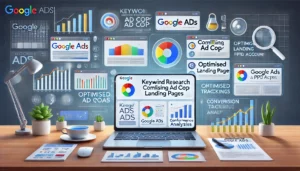Master Google AdWords PPC: A Comprehensive Guide for Your UK Businesses

Google AdWords PPC for UK Businesses: in the bustling UK market, brands are on a constant quest for efficiency and effectiveness in their digital marketing efforts. Google Ads, with its robust targeting capabilities and broad reach, presents an invaluable opportunity for UK businesses to maximise their return on investment (ROI). This article explores essential Google Ads strategies that cater to the dynamic needs of UK businesses, especially those that are always on the go. We’ll delve into the nuances of crafting compelling ad copy, optimizing landing pages for conversions, and leveraging powerful targeting options to ensure your message reaches the right customers at the right time.
Key Takeaways
- Mastering Google Ads requires a strategic approach to ad copy, ad extensions, and performance analysis for busy UK businesses to optimise conversions and efficiency.
- Google Local Ads can significantly benefit UK businesses by leveraging the ‘Local Pack’, targeting local audiences effectively, and understanding the qualifying criteria for campaigns.
- Analytical insights from data analytics and A/B testing are crucial for UK businesses to refine their Google Ads strategies and improve performance.
- Synergising PPC with SEO can lead to total search dominance, enhancing both paid and organic search efforts.
- Focusing on high-intent keywords, bid management, and creative ad design can drive better results and maximise your advertising budget.
Crafting Compelling Ad Copy for UK Audiences
Understanding Cultural Nuances
To craft compelling ad copy for UK audiences, it’s crucial to understand the cultural nuances that influence consumer behaviour. The UK is a diverse nation with distinct regional differences. Recognising these subtleties can significantly enhance the effectiveness of your ads. For instance, humour that works in London might not resonate in Manchester. Tailoring your ad copy to reflect these regional preferences can make your ads more relatable and engaging.
Utilising Emotional Triggers
Emotional triggers are powerful tools in ad copywriting. By tapping into emotions such as excitement, trust, or even the fear of missing out (FOMO), you can create a compelling narrative that drives action. Use phrases that evoke strong feelings and connect with your audience on a personal level. For example, highlighting a limited-time offer can create a sense of urgency, prompting quicker decision-making.
Incorporating Local Slang and References
Incorporating local slang and references can make your ad copy more relatable to UK audiences. Using terms and phrases that are familiar to your target demographic can create a sense of community and trust. However, it’s essential to use slang appropriately and ensure it aligns with your brand’s voice. Misusing local terms can have the opposite effect, making your brand seem out of touch.
Remember, the goal is to make your audience feel understood and valued. By paying attention to cultural nuances, emotional triggers, and local slang, you can craft ad copy that truly resonates with UK consumers.
Optimising Landing Pages for Higher Conversions
Designing User-Friendly Interfaces
A user-friendly interface is crucial for keeping visitors engaged and guiding them towards conversion. Ensure your landing page is clean, intuitive, and easy to navigate. Use clear headings, concise text, and prominent call-to-action buttons to direct users’ attention. A well-structured layout can significantly reduce bounce rates and improve user experience.
Implementing A/B Testing
A/B testing allows you to compare different versions of your landing page to determine which one performs better. Test various elements such as headlines, images, and call-to-action buttons. Consistently monitor the results and make data-driven decisions to optimise your page for higher conversions. Remember, even small changes can lead to significant improvements.
Enhancing Mobile Responsiveness
With a growing number of users accessing websites via mobile devices, enhancing mobile responsiveness is non-negotiable. Ensure your landing page loads quickly and displays correctly on all screen sizes. Use responsive design techniques to provide a seamless experience for mobile users. This not only improves user satisfaction but also boosts your search engine rankings.
Prioritising mobile responsiveness and user-friendly design can dramatically increase your landing page’s conversion rates.
Leveraging Google Local Ads for Maximum Impact
Understanding the ‘Local Pack’
Mastering Google Local Ads is essential for UK businesses aiming to maximise their ROI. The ‘Local Pack’ is the prime real estate of Google’s search results, showcasing the top local businesses relevant to a user’s query. Understanding how to secure a spot in this coveted section can significantly boost your visibility and drive more foot traffic to your store. To achieve this, ensure your Google My Business profile is fully optimised, including accurate NAP (Name, Address, Phone number) details, business hours, and customer reviews.
Targeting Local Keywords
Optimising your campaigns for local search queries is not just about including location-specific keywords; it’s about creating a seamless user experience from search to sale. Use tools like Google’s Keyword Planner to identify high-traffic local keywords relevant to your business. Incorporate these keywords naturally into your ad copy and landing pages to improve your ad relevance and Quality Score. Additionally, consider using ad extensions like location and call extensions to provide users with more ways to connect with your business.
Meeting Eligibility Criteria
To qualify for Google Local Ads, your business must meet specific eligibility criteria. This includes having a physical location, maintaining a verified Google My Business profile, and adhering to Google’s advertising policies. By meticulously refining your approach and meeting these criteria, you position your business to capitalise on local intent and drive meaningful engagement. Remember, the goal is to make your business stand out in the ‘Local Pack’ and create a local presence that feels personal and relevant to your audience.
By tailoring your Google Ads campaigns to reflect local dialects, events, and offers, you establish a connection that can significantly boost your conversion rates. Don’t overlook the importance of analysing the performance of your geo-targeted campaigns. Adjust and refine your strategies based on data-driven insights to continually improve your reach and ROI.
Advanced Targeting Strategies for UK Businesses
Utilising Demographic Targeting
In the bustling UK market, businesses are on a constant quest for efficiency and effectiveness in their digital marketing efforts. Google Ads, with its robust targeting capabilities and broad reach, presents an invaluable opportunity for UK businesses to maximise their return on investment (ROI). Mastering Google Ads requires a strategic approach to ad copy, ad extensions, and performance analysis for busy UK businesses to optimise conversions and efficiency.
Leveraging In-Market Audiences
Google Ads allows businesses to target potential customers based on their location, search history, and online behaviour. By focusing on a well-defined audience, businesses can create more effective and relevant ad campaigns. This is particularly beneficial for a London PPC agency looking to capture the local market.
Implementing Remarketing Campaigns
The key to success lies in continuous optimisation, strategic use of ad extensions, and staying current with evolving trends and algorithms. By embracing these essential strategies, UK businesses can not only survive but thrive in the competitive digital marketplace.
Analytical insights from data analytics and A/B testing are crucial for UK businesses to refine their Google Ads strategies and achieve better results.
Analysing Performance Metrics for Continuous Improvement
To truly master Google Ads PPC, it’s essential to embrace a cycle of continuous improvement through meticulous performance analysis. Start by diving deep into your campaign data, identifying trends and pinpointing areas ripe for optimisation. Regular PPC audits are a cornerstone of this process, ensuring that every aspect of your campaigns is performing at its peak.
Setting Up Conversion Tracking
Setting up detailed conversion tracking is crucial to understanding the customer journey from initial impression to final sale. This involves monitoring and tracking service performance, which allows you to see which ads are driving the most valuable actions. By synthesising data from various sources, including Google Analytics and asset group reporting, you can gain a comprehensive view of your campaign’s performance.
Interpreting Key Performance Indicators
Consider the following table as a snapshot of what to expect in a performance report:
| KPI | Baseline | Target | Actual | Variance |
|---|---|---|---|---|
| CTR | 2% | 3% | 2.5% | +0.5% |
| Conversion Rate | 5% | 7% | 6% | -1% |
| CPA (£) | 50 | 40 | 45 | +5 |
Interpreting this data allows you to pinpoint areas for improvement. For instance, a variance in CPA suggests a need to refine targeting or bidding strategies. Data is your roadmap; navigate it to reach your desired destination.
Conducting Regular Performance Audits
Regular performance audits are essential for continuous improvement. These audits involve a thorough analysis of resource requirements and allocation, ensuring that your marketing mix is optimised for the best results. By conducting these audits, you can identify underperforming areas and make necessary adjustments to enhance overall campaign effectiveness.
Integrating Google Ads with Organic Search Efforts
Integrating Google Ads with organic search efforts is a powerful strategy for achieving total search dominance. By combining PPC with SEO, you can create a seamless user experience that significantly boosts your click-through rates and conversions. Ensuring that your messaging and keywords are consistent across both channels is crucial for a cohesive journey from search to sale.
Synergising PPC and SEO
When aligning your PPC and SEO strategies, consider the following:
- Consistent Messaging: Ensure that your ad copy and organic content share the same tone and keywords.
- Unified Keywords: Use the same high-performing keywords in both your Google Ads PPC and organic search efforts.
- Data Sharing: Utilise insights from your PPC campaigns to inform your SEO strategy and vice versa.
Creating Thought-Leadership Content
Linking your ads to thought-leadership content can enhance your brand’s authority and trustworthiness. This approach not only drives traffic but also positions your business as an industry leader. Consider creating in-depth articles, whitepapers, and case studies that provide value to your audience.
Utilising ‘Near Me’ Keywords
Targeting high-converting ‘near me’ keywords is essential for local businesses. These keywords capture users with strong intent to purchase, making them highly valuable. Incorporate these keywords into both your Google Adwords PPC campaigns and your organic content to maximise visibility and conversions.
A well-integrated PPC and SEO strategy can lead to better marketing results and a more cohesive user experience. Continual learning and adaptation, informed by industry insights and performance data, are key to mastering Google Ads.
By following these strategies, you can effectively integrate your Google Ads efforts with your organic search strategies, ensuring a comprehensive approach to digital marketing.
Conclusion
Mastering Google Ads PPC is an ongoing journey that requires dedication, strategic planning, and continuous learning. For UK businesses, the potential rewards are immense, from increased website traffic to higher sales and improved brand visibility. By leveraging the insights and strategies discussed in this guide, you can create compelling ad campaigns that resonate with your target audience and drive meaningful results. Remember to focus on key elements such as ad copy, local targeting, and performance analysis to optimise your campaigns. Stay committed to refining your approach, and you’ll unlock the full potential of Google Ads PPC for your business.
Frequently Asked Questions
What are the key steps to optimising a Google Ads PPC account?
The key steps include conducting thorough keyword research, creating compelling ad copy, optimising landing pages, setting up conversion tracking, and continuously analysing performance metrics to make data-driven adjustments.
How can small businesses make the most of Google Ads?
Small businesses can maximise Google Ads by focusing on high-intent keywords, showcasing social proof on landing pages, prioritising local targeting, being selective with keywords, enhancing insights with conversion tracking, and aligning ads with thought-leadership content.
What are some insider tips for effective PPC campaign management?
Insider tips include using negative keywords to avoid irrelevant clicks, regularly A/B testing ad variations, leveraging ad extensions for better visibility, monitoring Quality Score, and adjusting bids based on performance data.
How important is A/B testing in Google Ads campaigns?
A/B testing is crucial as it allows you to compare different versions of your ads or landing pages to see which performs better. This helps in making informed decisions to optimise your campaigns for higher conversions.
What is the ‘Local Pack’ in Google Local Ads?
The ‘Local Pack’ is a feature in Google search results that displays a map and a list of local businesses relevant to the search query. It is highly beneficial for businesses targeting local customers.
How do I integrate Google Ads with my SEO efforts?
Integrate Google Ads with SEO by aligning your PPC and organic keyword strategies, creating high-quality content that serves both paid and organic goals, and using ‘Near Me’ keywords to capture local searches.
Author
Search Blog
Free PPC Audit
Subscribe to our Newsletter
The Voices of Our Success: Your Words, Our Pride
Don't just take our word for it. With over 100+ five-star reviews, we let our work-and our satisfied clients-speak for us.
"We have been working with PPC Geeks for around 6 months and have found Mark and the team to be very impressive. Having worked with a few companies in this and similar sectors, I rate PPC Geeks as the strongest I have come across. They have taken time to understand our business, our market and competitors and supported us to devise a strategy to generate business. I value the expertise Mark and his team provide and trust them to make the best recommendations for the long-term."
~ Just Go, Alasdair Anderson




